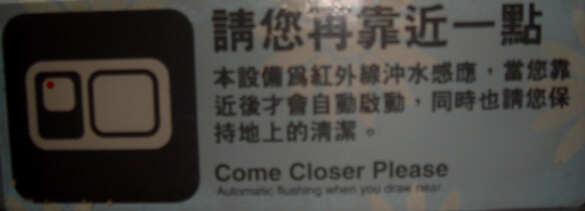If you know Japanese, Taipei can be a really frustrating city. Reading literature, all the way up to the beginning of the Showa Period, generally requires you to know the traditional forms of kanji–at least at first. But modern pocket additions*, while not otherwise abridged or bowdlerized, frequently use the official Japanese simplified forms, so you get used to not having to recognize the older characters. Taiwan still uses them, though, so even though I can’t pronounce them here, I’ve been using the writing to get my bearings.
It took me several days to remember that 點 is, in fact, 点. (Well, I didn’t remember so much as realize that a crawl inside a subway car that said 終點 wasn’t likely to mean anything else.) Amritas used to tell me that you didn’t really know an Asian language with a Chinese-derived script until you’d started with the traditional stroke-choked characters. He was right, I suppose, at least in terms of transferrable skills.
Something you notice right away traveling around Taipei: it’s a very pious city. I’m not referring to the people (though they may be as devout as they come for all I know). I mean the place names. Streets in Japan don’t usually have names–don’t get me started on the resulting headaches involved in trying to get somewhere for the first time–and blocks, train stations, and intersections are often named for a nearby landmark. Otherwise, they tend to be named for things in nature: Greenleaf, Middle River, Wisteria Mountain, and the like.
In Taipei, several of the major east-west arteries are named for Confucian virtues. My office is on 忠孝路 (“Loyalty and Filial Piety Avenue”). On the way, we pass 仁愛路 (“Humaneness and Love Avenue”). There’s a place between my friend’s apartment and our office called 明徳 (“limpid moral probity,” though as in Japan I guess it may refer to an era or exalted personage or something). I’m not sure I can handle quite that much uplift so early in the day, even after my second cup of coffee.
And I’m pretty certain that having a Catholic mother disqualifies me from working on a street called “Filial Piety.”
Taipei is also significantly slower-paced than Tokyo. I was listening to Roisin Murphy the other day on a run. Perfect soundtrack to Tokyo but all wrong here. Taipei isn’t brittle and frantic and electronic. It’s not a mountain hamlet, either, but even the center of the city doesn’t press in on you. I’m not sure how well that suits me; I like my cities to be cities. On the other hand, my friend’s apartment (where I’m staying) is in the north of the city on a mountain road, so hiking and hot springs and things are right out the door. That part’s not bad at all, and it’s helpful given all the bulky Western food I’ve been hoovering up since I got here. (American food is much better in Taipei than in Tokyo.)
Ack. Time to hie myself to the Straight Path of Loyalty and Filial Piety for the day.
* Nice malapropism, huh? Apparently, I can’t write in my native language anymore after two cups of coffee, either. editions/additions…affect/effect…mucus/mucous…okay, I think I’m all right now.

